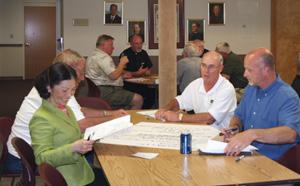
By Barb Arland-Fye
A planning-for-the-future process that involves all parishes in the Diocese of Davenport is getting a timeline extension to help further communicate its purpose. Originally scheduled to begin in September 2009 with completion in Advent 2010, the planning process will be extended one year.
The extension also avoids overloading clergy and lay people with meetings some of them would be juggling between the planning process and the diocese’s Capital Campaign.
Both projects were the focus of discussion June 14 at a joint meeting of the Diocesan Pastoral Council, Diocesan Planning Commission and Diocesan Presbyteral Council, held in St. Wenceslaus Parish in Iowa City.
Following opening prayer and reflection, Sister Laura Goedken, OP, the diocese’s development director, updated the groups about the $22 million Capital Campaign, which is just underway. Six parishes will participate in a campaign pilot project in the fall; other parishes will be phased in over the winter and spring months. Campaign organizers will meet with parish leaders to determine which phase they fit in, Sr. Goedken said.
Next, Father Jim Vrba and Marie Ware, co-chairs of the Diocesan Planning Commission, reported on the progress of the proposed Local Area Parish Planning Guidelines.
“This (guideline plan) looks at how parishes can better colloaborate in ministry,” Fr. Vrba said. Parishes will continue to be served by priests, but religious and lay people will also be assisting more extensively in leadership roles. “We need to get that message out,” he said.
Then participants broke into six small groups to discuss the positive parts of the guidelines and areas that could use improvement.
Among the positive aspects the groups identified:
• A realistic approach to lay participation
• Parishes will continue to be served by priests
• Parishes would be prompted to do more long-range planning
• Emphasis on good communication
• Promotion of Ministry Formation Program (MFP)
• Emphasis on grassroots participation
• Evolves from Living the Faith (a planning document adopted in 2005)
• A reality check in projecting availablity of priests
Suggested improvements focused on timing, particuarly relating to the Capital Campaign.
Fr. Vrba said dicoesan priests who gathered earlier this month for the Annual June Clergy Institute expressed concerns about the timing, but also wanted the diocese to be proactive rather than reactive in the planning process.
Tim McMahon, a member of the Diocesan Pastoral Council, didn’t think postponement would be wise. “Planning really is a positive process. We’re trying to create a plan for vibrant church communities,” he said. “It’s about who we are and where we want to go before making decisions.”
“We want the Capital Campaign to be very successful and we want the planning process to be very successful,” Ware said.
Dan Ebener, the diocese’s stewardship director, suggested that extending the deadline would not hurt the planning process. “We’ve done a lot of prep work.” What’s driving the planning process, he noted, is the shortage of priests.
Fr. Vrba suggested extending and expanding the planning process to include a vocations component, which Father Thom Hennen had suggested.
“Let’s use the lead time to do some educating” about the process and the collaborative efforts already happening among parishes and between churches of different denominations, said Fr. Vrba, who chairs the Presbyteral Council.
Father Charles Fladung, another member of the Presbyteral Council, said the diocese ought to draw from the experiences of the other Iowa dioceses: Des Moines, Sioux City and Dubuque. “What can we learn from them?”
Bishop Amos expressed appreciation for the two groups coming together for the meeting and for the recommendations they offered.








